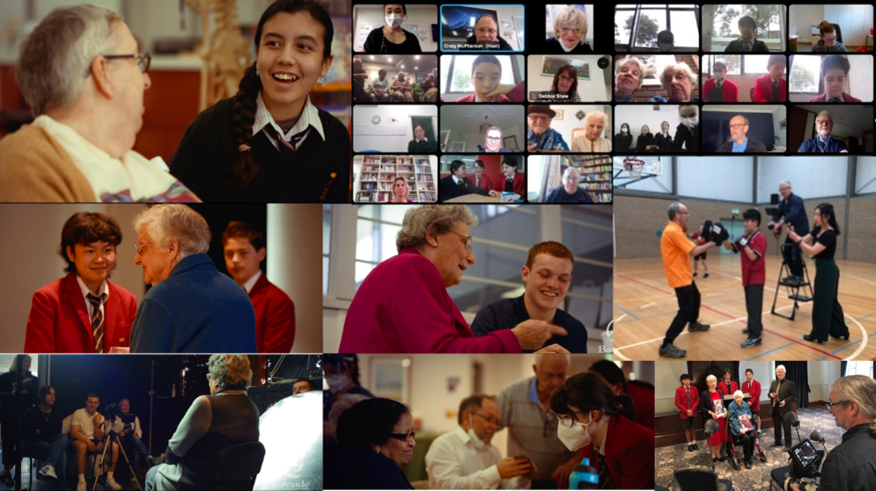Connecting the Generations: The Transformative Power of Intergenerational Digital Storytelling
By AAG members:
Mark Silver, Social Worker and Clinic Co-Director, Swinburne Wellbeing Clinic for Older Adults; Co-chair Australian Institute of Intergenerational Practice Advisory Council
Lysha Lee, PhD Candidate, Deakin University and National Ageing Research Institute; Research Coordinator, Swinburne Wellbeing Clinic for Older Adults; Convenor of Australian Institute of Intergenerational Practice Student and Early Career Group
Complex social challenges such as ageism, social isolation, and a lack of community cohesion are all too prevalent.
Intergenerational practice aims to unite diverse age groups to collaboratively address these issues. Intergenerational initiatives offer innovative approaches to build more inclusive, resilient communities. Here, we explore the transformative potential of one such intergenerational program: the Positive Ageing Digital Storytelling Intergenerational Program (PADSIP).

The program merges the genre of digital storytelling with intergenerational practice. Digital storytelling involves using multimedia elements to document first-hand experiences to convey emotionally relatable stories. The intergenerational dimension fosters meaningful engagement between the different generations (the image on the right is a collage of photos from various PADSIP programs).
The programs can take various forms to meet the diverse needs of participants; however at its core, PADSIP’s mission is to focus on building transformative connections across generations, forging empathy, trust, and mutual understanding through the power of storytelling and co-creation. An inclusive and respectful space is thus created where older adults, volunteers, students, and organisers build meaningful relationships, ensuring all voices are heard and valued. Digital stories are used to capture the multigenerational experiences and shared histories of participants. The process of co-creation as well as the stories themselves, have an impact on the participants and the broader community.
Several theories underpin intergenerational digital storytelling practice. Storytelling, rooted in narrative therapy and reminiscence practice, fosters trust and connection as individuals share experiences and emotions. Group work theory emphasises mutual support, empowering members and fostering a caring atmosphere. Trauma-informed practice ensures emotional safety and deeper connections. Therapeutic practice focuses on healing and identity. Intergenerational contact theory, particularly through the emphasis on strengthening friendships, has been shown to reduce ageism and increase cohesion between generations.
One of the strengths of PADSIP is its ability to adapt to diverse contexts; being able to meet the needs of the particular participants involved. Generally, PADSIP connects school students with older adults living in the community as well as in residential aged care. Over the years, the program has been implemented to include older adults with physical and/or cognitive disabilities; students with intellectual disability and neurodiversity; small and larger-scale initiatives; and virtual formats when physical contact is not possible; allowing participants to experience meaningful engagement with their communities. The program was recently integrated into school curricula in a couple of high schools in Victoria, providing the potential for embedded practice and sustainability.
There has been much heart-warming anecdotal feedback about the ‘magic’ of the program but It is also driven by evidence-based practice. The effectiveness and impact of PADSIP continues to be evaluated and this informs the development and improvement of PADSIP. A three-year pilot research project (under Swinburne University) will be concluding this year.
We strongly recommend:
- Encouraging intergenerational digital storytelling practice
- Advocating for intergenerational program’s role in building stronger, more connected communities
- Linking to Australian Institute of Intergenerational Practice (AIIP)
For a taster, take a look at this documentary by a Year 6 Student from Yackandandah Primary, Victoria 2023, and another from the Merle Mitchell Memorial Project, City of Monash, Victoria 2023 (password: padsip).
For AAG members, this blog is also available as a pdf.